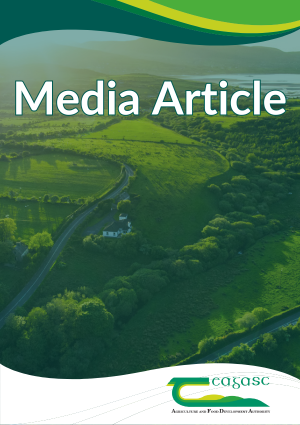
Reducing Stress on your Farm in 2025
Reducing Stress on your Farm in 2025 04 March 2025 Type Media Article By Marion Fox, B&T Drystock Adviser, Teagasc Galway/Clare The farmer is a very important person on any farm, therefore it is important that we get a health check done regularly. Farmers are very good at looking after their animals but very often […]
By By Marion Fox, B&T Drystock Adviser, Teagasc Galway/Clare

Reducing Stress on your Farm in 2025
Type Media Article
By Marion Fox, B&T Drystock Adviser, Teagasc Galway/Clare
The farmer is a very important person on any farm, therefore it is important that we get a health check done regularly. Farmers are very good at looking after their animals but very often forget about their own health. I have a list of items that you should focus on in 2025 to help reduce stress
Health and Safety on Farms
A clean farmyard makes working more enjoyable thus having a positive effect on your mental health. 20% of farm accidents could be eliminated without any financial cost, if work places were clean, tidy and clutter free.
Calving and lambing can be an extremely busy time on many farms. It is essential that farms are kept clean and animals are well bedded to avoid disease. Farmer health is very important and sometimes can be forgotten about especially during busy periods. It is very important that hands are washed regularly and that gloves are worn during the calving and lambing period to prevent infection to both the farmer and the animal. There are dangers where diseases from animals can pass to humans for examples Toxoplasmosis in sheep, pregnant woman should avoid close contact with sheep during the lambing period. Farmers are more likely to suffer cuts and grazes, which can become infected and potentially lead to sepsis. Sepsis arises when the body’s response to an infection injures its own tissues and organs; it requires immediate attention from your GP.
BISS 2025
The BISS application is very important and requires full attention in order to complete correctly to avoid penalties and delays in payments. I encourage farmers when completing their applications that they have applied for the relevant schemes ie ANC, ECO, CRISS CISYF. All maps should be checked to make sure all parcels are on the application. Other schemes that you should check out for updates when completing the BISS application are the Straw Incorporation Measure, ACRES and if applicable the Organic Farming Scheme, along with the Multi-species Sward Measure and the Red Clover Silage Measure.
Good Agricultural and Environmental Condition (GAEC)
There is an obligation on you the farmer for keeping land in good agricultural and environment condition. There are seven conditions, which cover a range of standards relating to soil, protection and maintenance of soil organic matter, avoiding the deterioration of habitats and water protection. Farmers need to pay particular attention to GAEC 7 for (Crop Rotation and Diversification in Arable Lands), and GAEC 2 (Protecting Peatlands and Wetlands) in 2025. Farmers that are affected by GAEC 2 will be notified in due course of the parcels affected. DAFM have stated that in relation to GAEC 2 (Protecting Peatlands and Wetlands) farmers will be allowed to maintain existing drains on their farms. However, any planned drainage works undertaken should be checked for GAEC 2 regulations before any works can begin. If the parcel is flagged on the system they will need planning permission. Ploughing deeper than 30cm will be banned on these parcels. Grassland parcels will only be allowed to be reseeded 1 year in 4 years if in this category.
Herd Number Changes
If there are any changes to the registration details on the herd number, this application must be submitted to the DVO before the closing date for BISS. This may occur where a farmer is adding or removing name(s) to the herd number or dissolving a joint venture or registered farm partnership, setting up or dissolving a company, following the retirement of a farmer or through inheritance. Where the herd number change form is submitted but not processed before the BISS closing date, the BISS application for 2025 should be submitted under the new entity. Any change to the registration details on the herd number will require a change to the registration details on the entitlements. A transfer of entitlements application will be required to complete this process. The name of the person controlling the entitlements must match the name at the top of the BISS application.
Fertiliser
Farmers need to know the fertiliser allowance and stocking rate for their farms in order to plan what slurry method and chemical fertiliser that can be applied. In order to know these figures you will need to know your stocking rate and prepare a fertiliser plan for the farm. From January 1st 2025 the use of low emission slurry spreading (LESS) has become compulsory on farms stocked at 100kg N/ha or above on 2024 stocking rate. I urge farmers to contact your advisor if you don’t know your fertiliser allowance for your land.
Planning your workload is key in order to reduce stress levels and making life easier during busy periods on your farm.
